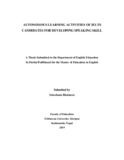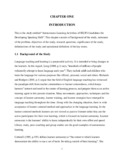Please use this identifier to cite or link to this item:
https://elibrary.tucl.edu.np/handle/123456789/1836| Title: | Autonomous Learning Activities of Ielts Candidates for Developing Speaking Skill |
| Authors: | Bhattarai, Sulochana |
| Keywords: | Learning;Activities |
| Issue Date: | 2019 |
| Publisher: | Central Department of English |
| Abstract: | This research entitled Autonomous Learning Activities of IELTS Candidates for Developing Speaking Skill aimed to explore the autonomous learning activities of the IELTS candidates for developing speaking skill. To attain the objectives of this research, I chose a mix- method research design. As a sample, I selected 40 IELTS candidates who were preparing for IELTS examination in Kathmandu valley using convenience sampling procedure. Both the primary and secondary sources of data were utilized in research. Questionnaire and interview were used as the main research tools to collect the data required for the study. The data collected from the participants were analyzed and interpreted by using both descriptive as well as stastical tools. The findings of the study showed that all the IELTS candidates made use of a wide range of autonomous learning activities independently to enhance their speaking skill. Among the various activities, some of their most dominant autonomous activities include; using library, self-study and taking own’s responsibility, using internet and computer, brain stroming, involving in mock exam, listening English news and songs, practicing IELTS books, participating in discussion, conversation and debate competition etc.The finding also indicated that the respondents did not use any particular criteria or the ways for the selection of autonomous activities, they rather emphasized their interest, desire, convenience and comfort level. Similarly, all the respondents strongly realized the need of autonomous learning activities for developing their speaking skill. Moreoover, in their experiences, autonomous learning made them creative, motivated, confident and responsible which are very much necessary to develop their speaking skill. This thesis has been organized in to five chapters. The first chapter deals with the background of the study, statement of the problem, objectives, research questions, significance of the study, delimitations of the study and operational definitions of key terms of the study. The second chapter incorporates review of related theoretical literature, empirical literature, implication of the review for the study and conceptual framework. In the same way, third chapter deals with the methodology employed to conduct the study. It gives information about the design of the study, population and sample, sampling strategies, study area, data collection tools, data collection procedure and data analysis and interpretation procedure. Similarly, the forth chapter deals with the analysis of data and interpretation of the results and summary of the findings. Accordingly, the fifth chapter includes conclusions and recommendations. Some recommendations for policy related, practice related and further research related are presented in this section. This chapter is followed by references and appendices. |
| URI: | http://elibrary.tucl.edu.np/handle/123456789/1836 |
| Appears in Collections: | English Language Education |
Files in This Item:
| File | Description | Size | Format | |
|---|---|---|---|---|
| Cover Page-8.pdf | 339.18 kB | Adobe PDF |  View/Open | |
| CHAPTER.pdf | 1.27 MB | Adobe PDF |  View/Open |
Items in DSpace are protected by copyright, with all rights reserved, unless otherwise indicated.
